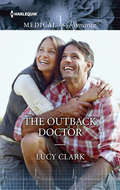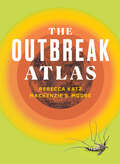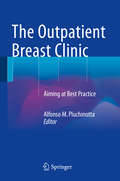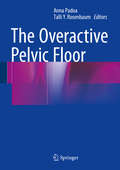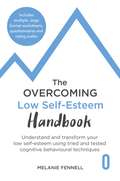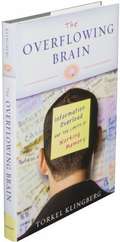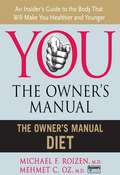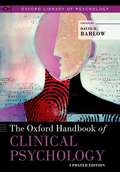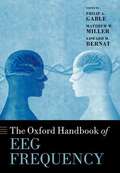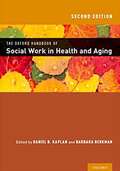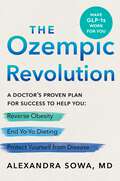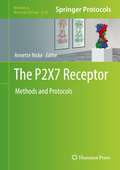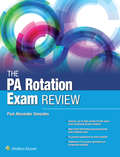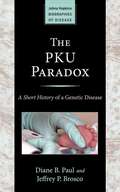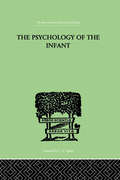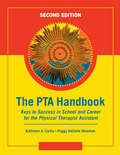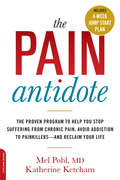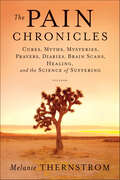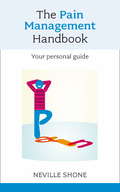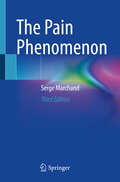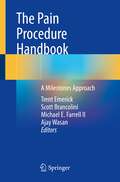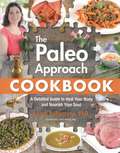- Table View
- List View
The Outback Doctor
by Lucy ClarkBroken Hill's doctor and general surgeon Dave Dunbar has no time for sophisticated city girls, and when he encounters his new anasthetist from Sydney he knows there's going to be trouble. They meet at the site of a medical emergency, and even covered in the dust of the Australian outback, Rose Partridge is gorgeous. She's also fiercely independent and touchingly vulnerable.It's a compelling combination, and although their relationship is tense, Dave finds himself wanting more than her medical expertise. But can this rough diamond break down the barriers of a woman who has locked her heart away?
The Outbreak Atlas
by Rebecca Katz Mackenzie S. MooreThe public has taken a new level of interest in outbreak response since 2020, learning epidemiological terms and seeking information about how to stay prepared in a pandemic. Public health professionals are calling on citizen scientists&’ participation as outbreaks are increasingly occurring in complex environments, expanding the number of people and types of activities required to control the spread of disease. However, there is no comprehensive source mapping this complexity and detailing needed actions tailored to the public. For years the Georgetown University Center for Global Health Science and Security has curated an interactive online tool for professionals that identifies the activities involved across all phases of an outbreak. The Georgetown Outbreak Activity Library (GOAL) captures what needs to get done, when, and by whom. Now, in The Outbreak Atlas, Rebecca Katz and Mackenzie S. Moore have translated this complex material into a book designed for a public audience. This book provides an overview of outbreak activities alongside compelling case studies and visuals to guide readers through the complexity involved in outbreak preparedness, response, and recovery. It lifts the curtain on the rationale and interconnectedness of outbreak responses across different fields and at various levels, presenting accessible information that ensures a shared understanding of the essential activities to control an outbreak.
The Outpatient Breast Clinic
by Alfonso M. PluchinottaThis full-colour, richly-illustrated book is an excellent source of rapidly retrievable information on aspects of relevance in daily clinical practice in the outpatient breast clinic. Expert guidance is provided on a full range of topics, including pitfalls of clinical examination, imaging and related tissue diagnosis, approaches to management decision-making in different disorders, the role of surgery and adjuvant therapy, follow-up and rehabilitation. In outpatient breast clinics, effective communication with patients must be established in order to address symptoms that in most cases are not serious but can be very worrying and sometimes lead to misdiagnosis and also to litigation. Outpatient consultations also offer an opportunity to encourage a healthy lifestyle and to provide information on matters such as risk assessment, screening and the most reliable websites. A well-functioning outpatient clinic is essential to a breast unit's overall proficiency. Readers will find this book an invaluable aid to good practice. The authors place particular emphasis on quality indicators and key priorities for implementation of the main guidelines, at the same time specifying the level of evidence for them and degree of recommendation. Practical measures for achieving the best results are highlighted, and helpful advice is provided on optimizing patient communication and reducing the psychological burden.
The Overactive Bladder: Evaluation and Management
by Roger Dmochowski Karl KrederOveractive bladder (OAB) affects millions of men and women daily. Given the symptoms of sleep loss, depression, and a lower quality of life than even those with diabetes mellitus, effective and beneficial treatment is a must for these people. Drs Kreder and Dmochowski, both recognized experts on voiding dysfunction and urodynamics, have a
The Overactive Pelvic Floor
by Anna Padoa Talli Y. RosenbaumThis textbook provides a comprehensive, state-of-the art review of the Overactive Pelvic Floor (OPF) that provides clinical tools for medical and mental health practitioners alike. Written by experts in the field, this text offers tools for recognition, assessment, treatment and interdisciplinary referral for patients with OPF and OPF related conditions. The text reviews the definition, etiology and pathophysiology of non-relaxing pelvic floor muscle tone as well as discusses sexual function and past sexual experience in relation to the pelvic floor. Specific pelvic floor dysfunctions associated with pelvic floor overactivity in both men and women are reviewed in detail. Individual chapters are devoted to female genital pain and vulvodynia, female bladder pain and interstitial cystitis, male chronic pelvic and genital pain, sexual dysfunction related to pelvic pain in both men and women, musculoskeletal aspects of pelvic floor overactivity, LUTS and voiding dysfunction, and anorectal disorders. Assessment of the pelvic floor is addressed in distinct chapters describing subjective and objective assessment tools. State of the art testing measures including electromyographic and video-urodynamic analysis, ultrasound and magnetic resonance imaging are introduced. The final chapters are devoted to medical, psychosocial, and physical therapy treatment interventions with an emphasis on interdisciplinary management The Overactive Pelvic Floor serves physicians in the fields of urology, urogynecology and gastroenterology as well as psychotherapists, sex therapists and physical therapists.
The Overcoming Low Self-esteem Handbook: Understand and Transform Your Self-esteem Using Tried and Tested Cognitive Behavioural Techniques
by Dr Melanie FennellBoost your confidence and change your life for the betterLow self-esteem can make life difficult in all sorts of ways. It can make you anxious and unhappy, tormented by doubts and self-critical thoughts. It can get in the way of feeling at ease with other people and stop you from leading the life you want to lead. It makes it hard to value and appreciate yourself in the same way you would another person you care about.Melanie Fennell's acclaimed and bestselling self-help guide Overcoming Low Self-esteem has become a classic of self-help literature, winning widespread praise for its practical and user-friendly approach. At last, this benchmark work is available as a large format, practical manual, complete with worksheets, diaries and exercises.The Overcoming Low Self-esteem Handbook will help you to understand your low self-esteem and break out of the vicious circle of self-destructive thinking, distress and unhelpful behaviour. Using practical techniques from cognitive behavioural therapy (CBT), this book will help you learn the art of self-acceptance and so transform your sense of yourself for the better. Specifically, you will:· Find out how low self-esteem develops and what keeps it going· Question your negative thoughts and the attitudes that underlie them· Identify your strengths and good qualities, allow yourself to enjoy life to the full, and discover a more balanced, kindly view of yourself· Trace your progress, monitor your behaviour and record step-by-step improvementsIdeal for working through on your own or with guided assistance, this is a complete step-by-step treatment guide.Overcoming self-help guides use clinically proven techniques to treat long-standing and disabling conditions, both psychological and physical. Many guides in the Overcoming series are recommended under the Reading Well scheme.Series Editor: Emeritus Professor Peter Cooper
The Overcoming Low Self-esteem Handbook: Understand and Transform Your Self-esteem Using Tried and Tested Cognitive Behavioural Techniques
by Melanie FennellBoost your confidence and change your life for the betterLow self-esteem can make life difficult in all sorts of ways. It can make you anxious and unhappy, tormented by doubts and self-critical thoughts. It can get in the way of feeling at ease with other people and stop you from leading the life you want to lead. It makes it hard to value and appreciate yourself in the same way you would another person you care about.Melanie Fennell's acclaimed and bestselling self-help guide Overcoming Low Self-esteem has become a classic of self-help literature, winning widespread praise for its practical and user-friendly approach. At last, this benchmark work is available as a large format, practical manual, complete with worksheets, diaries and exercises.The Overcoming Low Self-esteem Handbook will help you to understand your low self-esteem and break out of the vicious circle of self-destructive thinking, distress and unhelpful behaviour. Using practical techniques from cognitive behavioural therapy (CBT), this book will help you learn the art of self-acceptance and so transform your sense of yourself for the better. Specifically, you will:· Find out how low self-esteem develops and what keeps it going· Question your negative thoughts and the attitudes that underlie them· Identify your strengths and good qualities, allow yourself to enjoy life to the full, and discover a more balanced, kindly view of yourself· Trace your progress, monitor your behaviour and record step-by-step improvementsIdeal for working through on your own or with guided assistance, this is a complete step-by-step treatment guide.Overcoming self-help guides use clinically proven techniques to treat long-standing and disabling conditions, both psychological and physical. Many guides in the Overcoming series are recommended under the Reading Well scheme.Series Editor: Emeritus Professor Peter Cooper
The Overflowing Brain
by Elkhonon Goldberg Torkel KlingbergAs the pace of technological change accelerates, we are increasingly experiencing a state of information overload. Statistics show that we are interrupted every three minutes during the course of the work day. Multitasking between email, cell-phone, text messages, and four or five websites while listening to an iPod forces the brain to process more and more informaton at greater and greater speeds. And yet the human brain has hardly changed in the last 40,000 years. Are all these high-tech advances overtaxing our Stone Age brains or is the constant flood of information good for us, giving our brains the daily exercise they seem to crave? In The Overflowing Brain, cognitive scientist Torkel Klingberg takes us on a journey into the limits and possibilities of the brain. He suggests that we should acknowledge and embrace our desire for information and mental challenges, but try to find a balance between demand and capacity. Klingberg explores the cognitive demands, or "complexity," of everyday life and how the brain tries to meet them. He identifies different types of attention, such as stimulus-driven and controlled attention, but focuses chiefly on "working memory," our capacity to keep information in mind for short periods of time. Dr Klingberg asserts that working memory capacity, long thought to be static and hardwired in the brain, can be improved by training, and that the increasing demands on working memory may actually have a constructive effect: as demands on the human brain increase, so does its capacity. The book ends with a discussion of the future of brain development and how we can best handle information overload in our everyday lives. Klingberg suggests how we might find a balance between demand and capacity and move from feeling overwhelmed to deeply engaged.
The Owner's Manual Diet
by Michael F. Roizen Mehmet OzBetween your full-length mirror and high-school biology class, you probably think you know a lot about the human body. While it's true that we live in an age when we're as obsessed with our bodies as we are with celebrity hairstyles, the reality is that most of us know very little about what chugs, churns, and thumps throughout this miraculous, scientific, and artistic system of anatomy. Yes, you've owned your skin-covered shell for decades, but you probably know more about your cell-phone plan than you do about your own body. When it comes to your longevity and quality of life, understanding your internal systems gives you the power, authority, and ability to live a healthier, younger, and better life. The flagship book of the YOU series, which spawned three subsequent New York Times bestsellers, has now been expanded and updated to make you understand your body even better-perhaps too well. YOU: The Owner's Manual, Updated and Expanded Edition challenges your preconceived notions about how the human body works and ages, then takes you on a tour through all of the highways, back roads, and landmarks inside of you. In this update, the doctors have included a new chapter on the liver and pancreas, which will finally demystify the most exotic parts of our bodies; a new workout chapter that will finally get you moving; and nearly one hundred Q&As asked by you, the reader. It has also been updated throughout to give you up-to-the-minute know-how to not just understand what to do to keep fit, but also why and how. The book opens with a quiz, "How Well Do You Know Your Body?," which sets the stage for the following chapters. After taking the quiz, you'll learn about all of your blood-pumping, food-digesting, and keys-remembering systems and organs, including the heart, brain, lungs, immune system, bones, and sensory organs. Each chapter also contains common myths of the particular body part that the authors will debunk. Just as important, you'll get the facts and advice you need to keep your body running long and strong. You'll find out how diseases start and how they affect your body-as well as advice on how to prevent and beat conditions that threaten your quality of life. Complete with exercise tips, nutritional guidelines, simple lifestyle changes, and alternative approaches, YOU: The Owner's Manual, Updated and Expanded Edition gives you an easy, comprehensive, and life-changing how-to plan for fending off the gremlins of aging. To top it off, this new edition includes even more great-tasting and calorie-saving recipes as part of the Owner's Manual Diet-an eating plan that is designed with only one goal in mind: to help you live a younger life. Welcome to your body. Why don't you come on in and take a look around?
The Oxford Handbook Of Clinical Psychology (Oxford Library Of Psychology)
by David H. BarlowThe exponential growth of clinical psychology since the late 1960s can be measured in part by the extensive-perhaps exhaustive-literature on the subject. This proliferation of writing has continued into the new century, and the field has come to be defined as much by its many topics as its many voices. <p><p> In addition to core sections on topics such as training, assessment, diagnosis, and intervention, the handbook includes valuable chapters devoted to new and emerging issues in the clinical field, including heath care reforms, cultural factors, and technological innovations and challenges. Each chapter offers a review of the most pertinent literature, outlining current issues and identifying possibilities for future research. <p> Featuring two chapters by Editor David H. Barlow -- one on changes during his own 40-year odyssey in the field, the other projecting ten themes for the future of clinical psychology -- The Oxford Handbook of Clinical Psychology is a landmark publication that is sure to serve as the field's benchmark reference publication for years to come. It is an essential resource for students, clinicians, and researchers across the ever-growing clinical psychology community.
The Oxford Handbook of EEG Frequency (Oxford Library of Psychology Series)
by Matthew Miller Philip Gable Edward BernatThe use of electroencephalography (EEG) to study the human mind has seen tremendous growth across a vast array of disciplines due to increased ease of use and affordability of the technology. Typically, researchers study how the magnitude of the waves changes over time or how the rhythm (frequency) of the waves changes over time. <p><p>The Oxford Handbook of EEG Frequency is arguably the first book to comprehensively describe the ways to study how the frequency of the waves changes over time and how changes in frequency are linked to cognitive, affective, and motor processes.
The Oxford Handbook of Social Work in Health and Aging
by Daniel Kaplan Barbara BerkmanThis Second Edition of the Handbook addresses the evolving interdisciplinary health care context and the broader social work practice environment, as well as advances in the knowledge base which guides social work service delivery in health and aging. This includes recent enhancements in the theories of gerontology, innovations in clinical interventions, and major developments in the social policies that structure and finance health care and senior services. <p><p>In addition, the policy reforms of the 2010 Patient Protection and Affordable Care Act set in motion a host of changes in the United States healthcare system with potentially profound implications for the programs and services which provide care to older adults and their families. <p><p>In this volume, the most experienced and prominent gerontological health care scholars address a variety of populations that social workers serve, and the arenas in which they practice, followed by detailed recommendations of best practices for an array of physical and mental health conditions. The volume's unprecedented attention to diversity, health care trends, and implications for practice, research, policy make the publication a major event in the field of gerontological social work. <p><p>This is a Must-Read for all social work social work educators, practitioners, and students interested in older adults and their families.
The Ozempic Revolution: A Doctor's Proven Plan for Success to Help You Reverse Obesity, End Yo-Yo Dieting, and Protect Yourself from Disease
by Alexandra Sowa"The Ozempic Revolution by Dr. Alexandra Sowa is a groundbreaking exploration of GLP-1 receptor agonists, like Ozempic, that have transformed the treatment of obesity and diabetes. Dr. Sowa combines scientific insights with practical advice, making it accessible for both medical professionals and general readers. She delves into the mechanisms of GLP-1, its benefits beyond weight loss, and its implications for overall health. If you're interested in the intersection of science, health, lifestyle and innovative treatments, this book is a must-read!" -Mary Claire Haver, MD, board certified OBGYN and New York Times bestselling author of The New MenopauseThe first comprehensive user guide to GLP-1s (such as Ozempic, Wegovy, and Zepbound) with an overview of how they work and possible side effects. Also including companion recipes, exercise guidance, and new habits to maintain lifelong health and keep weight off for good.The newest class of weight loss drugs (GLP-1s) are complete game-changers in their potential to reverse obesity and its related diseases, with nearly 50% of Americans qualifying for the use of these drugs. Already 1 in 8 Americans say they’ve tried a GLP-1 medication—but with many acquiring their prescription from online pharmacies, med spas, and general practitioners, they face a huge gap between trying the drug and achieving their health goals with it long-term.That’s where The Ozempic Revolution comes in. Alexandra Sowa, MD, a leading obesity medicine specialist, shares her expertise on this much-discussed but largely misunderstood class of medications, including information like:What the GLP-1 experience really feels likeHow to know if you’re a candidate for these medicationsHow to get a prescription and get it covered by insuranceHow to manage and reduce unwanted side effectsUnique food plans and strategies for managing the mental challenges of losing weightSimple, easy recipes for when you don’t feel like eatingTraditional and social media has been flooded with junk information and stigmatizing headlines about GLP-1s, and in this book, Dr. Sowa digs into all of it—the good, the bad, and the ugly—bringing the science to light.If you’re curious about how GLP-1s might fit into your life, or want to optimize your experience while taking them, then Dr. Sowa’s clear-eyed, fully informed approach is a must-read. The Ozempic revolution changes everything: these drugs finally provide a viable, healthy, and sane way to lose weight, avoid disease, and maintain your health gains for life.
The P2X7 Receptor: Methods and Protocols (Methods in Molecular Biology #2510)
by Annette NickeThis detailed volume covers diverse aspects of P2X7 receptor analysis, ranging from its molecular structure to related pharmacological and immunological tools, via its analysis in heterologous expression systems as well as assays using primary cells and whole animal models. After three introductory chapters that focus on its structure, ligands, and physiological functions, the book details the generation of antibody and nanobody tools for P2X7 receptors, provides protocols for the analysis of expressed P2X7 receptors with a focus on their electrophysiological analysis, as well as protocols for the investigation of P2X7 down-stream signaling in immune cells by flow cytometry. Mouse models and procedures suited to investigate P2X7-mediated effects in other primary cells and in vivo are also explained. Written for the highly successful Methods in Molecular Biology series, chapters include introductions to their respective topics, lists of the necessary materials and reagents, step-by-step, readily reproducible laboratory protocols, and tips on troubleshooting and avoiding known pitfalls. Authoritative and practical, The P2X7 Receptor: Methods and Protocols is a valuable reference not only for the growing community fascinated by this unusual ion channel but also for a broad readership interested in ion channels or purinergic receptors.
The PA Rotation Exam Review
by Paul GonzalesPublisher's Note: Products purchased from 3rd Party sellers are not guaranteed by the Publisher for quality, authenticity, or access to any online entitlements included with the product. Prepare for the rotation exams with the first exam prep resource to cover all of the most commonly tested rotations! Presented in a full-color, concise format, this must-have new book covers high-yield content from each of the major PA rotations: Internal Medicine, Family Medicine, Pediatrics, OB/GYN, Surgery, Emergency Medicine, and Psychiatry. Featuring 25 practice questions, with an additional 25 available online, for each rotation, this practical solution offers you everything you need for rotation exam success.
The PDR Pocket Guide to Prescription Drugs
by Pdr StaffBased on the Physicians' Desk Reference, the most highly trusted drug information references for more than 66 years, The PDR Pocket Guide to Prescription Drugs is an A to Z listing of more than 1,000 brand-name and generic drugs, all based on FDA-approved information. The guide answers frequently asked questions such as: Why was this drug prescribed for me? What are the benefits and risks of taking this drug? Are there any side effects I should watch for? What questions should I ask my doctor about this prescription?
The PKU Paradox: A Short History of a Genetic Disease (Johns Hopkins Biographies of Disease)
by Diane B. Paul Jeffrey P. BroscoHow did a disease of marginal public health significance acquire paradigmatic status in public health and genetics? In a lifetime of practice, most physicians will never encounter a single case of PKU. Yet every physician in the industrialized world learns about the disease in medical school and, since the early 1960s, the newborn heel stick test for PKU has been mandatory in many countries. Diane B. Paul and Jeffrey P. Brosco’s beautifully written book explains this paradox.PKU (phenylketonuria) is a genetic disorder that causes severe cognitive impairment if it is not detected and treated with a strict and difficult diet. Programs to detect PKU and start treatment early are deservedly considered a public health success story. Some have traded on this success to urge expanded newborn screening, defend basic research in genetics, and confront proponents of genetic determinism. In this context, treatment for PKU is typically represented as a simple matter of adhering to a low-phenylalanine diet. In reality, the challenges of living with PKU are daunting.In this first general history of PKU, a historian and a pediatrician explore how a rare genetic disease became the object of an unprecedented system for routine testing. The PKU Paradox is informed by interviews with scientists, clinicians, policymakers, and individuals who live with the disease. The questions it raises touch on ongoing controversies about newborn screening and what happens to blood samples collected at birth.
The PSYCHOLOGY OF THE INFANT (International Library Of Psychology Ser. #Vol. 2)
by Bernfeld, SiegfriedFirst Published in 1999. Routledge is an imprint of Taylor & Francis, an informa company.
The PTA Handbook: Keys to Success in School and Career for the Physical Therapist Assistant
by Kathleen A. Curtis Peggy DeCelle NewmanThe updated Second Edition of The PTA Handbook is a unique textbook that serves students from pre-admission into a physical therapist assistant program, through the academic program, up to career entry and practice as a physical therapist assistant.Dr. Kathleen A. Curtis and Peggy DeCelle Newman have updated this Second Edition to reflect current practice standards, including updated core professional documents addressing direction and supervision to align with developments in the physical therapy profession. The PTA Handbook, Second Edition expands on the popular first edition and includes an overview of the physical therapy profession, the physical therapist (PT) – physical therapist assistant (PTA) preferred relationship, evidenced-based practice and information literacy, diversity and cultural proficiency, and planning for life-long learning and leadership development.What is new in the Second Edition:• Includes key documents that guide the provision of physical therapy services and describe the relationship between delivery of care by the PT and PTA• Career development strategies for the PTA, including criteria for Recognition of Advanced Proficiency for the Physical Therapist Assistant and leadership roles in professional, clinical, and community contexts• Case studies and “Putting It Into Practice” exercises are user-friendly, realistic approaches to enhance student learning and comprehension through immediate and meaningful application of the topic being discussed• Written as a strategy-based guide to success for PTA students in meeting the required demands and expectations during a PTA program as well as in practice in the fieldThe PTA Handbook, Second Edition also covers information that will assist advisors and counselors in college and work re-entry programs to provide guidance regarding the physical therapy profession and specifically the differing roles of the PTA and PT. This text will also serve as a key guide for groups of 21st century learners frequently seeking PTA education, including first-generation college students, adult learners, career re-entry, second-language learners, and learners with disabilities.The PTA Handbook: Keys to Success in School and Career for the Physical Therapist Assistant, Second Edition is an essential reference for students, educators, advisors and counselors, and therapy managers who want to maximize the potential for success of the PTA.
The Pain Antidote: The Proven Program to Help You Stop Suffering from Chronic Pain, Avoid Addiction to Painkillers--and Reclaim Your Life
by Katherine Ketcham Mel PohlChronic pain is not a life sentence If you are one of the 100 million people who suffer from chronic pain, you may be feeling hopeless and helpless, relying on endless medications that don't work, feeling worse and worse. But there is hope--and help. The innovative program at the acclaimed Las Vegas Recovery Center, at which Dr. Mel Pohl is Medical Director, has helped thousands of sufferers to reduce chronic pain without the use of painkillers. The Pain Antidote shares this program's concrete tools and strategies, offering: Cutting-edge research on how pain affects your brain How your emotions affect your experience of pain A comprehensive program, including a four-week Jump Start plan Pain-reducing gentle exercises and health-supporting foods And much more.
The Pain Chronicles: Cures, Myths, Mysteries, Prayers, Diaries, Brain Scans, Healing, and the Science of Suffering
by Melanie ThernstromEach of us will know physical pain in our lives, but none of us knows when it will come or how long it will stay. Today as much as 10 percent of the population of the United States suffers from chronic pain. It is more widespread, misdiagnosed, and undertreated than any major disease. While recent research has shown that pain produces pathological changes to the brain and spinal cord, many doctors and patients still labor under misguided cultural notions and outdated scientific dogmas that prevent proper treatment, to devastating effect.In The Pain Chronicles, a singular and deeply humane work, Melanie Thernstrom traces conceptions of pain throughout the ages—from ancient Babylonian pain-banishing spells to modern brain imaging—to reveal the elusive, mysterious nature of pain itself. Interweaving first-person reflections on her own battle with chronic pain, incisive reportage from leading-edge pain clinics and medical research, and insights from a wide range of disciplines—science, history, religion, philosophy, anthropology, literature, and art—Thernstrom shows that when dealing with pain we are neither as advanced as we imagine nor as helpless as we may fear.Both a personal meditation and an intellectual exploration, The Pain Chronicles illuminates and makes sense of the all-too-human experience of pain—and confronts with extraordinary grace and empathy its peculiar traits, its harrowing effects, and its various antidotes.
The Pain Management Handbook: Your Personal Guide
by Neville ShoneChronic pain affects more than 8.5 million people in the UK and costs the economy 18 billion pounds a year in lost work days; while an estimated 30%, or up to 70 million people, also suffer in the US, where it's said to be the most costly health problem. Yet, according to one study, two out of three people say that their medication is not always adequate, while 96% of GPs believe there is significant room for improving treatment. Another survey found that a half to two-thirds of people with chronic pain are less able or unable to exercise, enjoy normal sleep, perform household chores, attend social activities, drive a car, or walk; while a quarter find that relationships with family and friends are strained or broken. Neck pain, back pain, arthritis, allergies and depression are listed as the top five chronic health problems.Once established, chronic pain is difficult to alleviate. However, research shows that pain management programmes do limit the experience of pain, improving physical functioning and reducing isolation and depression. This book is a step by step guide to managing pain that may be used by the individual or by groups; it may also be of use to health professionals.
The Pain Phenomenon
by Serge MarchandIntroducing the latest edition of The Phenomenon of Pain: A Comprehensive Exploration of Pain Mechanisms and Therapeutic Approaches.In recent decades, pain has emerged as a focal point in both basic and clinical research, reflecting its profound impact on individuals' lives. The rapid advancement of knowledge has deepened our understanding of the complex neurophysiological and psychological mechanisms underlying pain, shedding light on its multifaceted nature. Clinicians grapple daily with the daunting reality of human suffering, navigating its intricate web of causes and manifestations. This continuous engagement with pain presents significant and stressful challenges from the relentless pursuit of understanding and alleviating it. This book transcends mere discourse on the physiological and psychological underpinnings of pain; it delves into the intricate factors contributing to its persistence. Furthermore, it meticulously examines pharmacological and nonpharmacological treatment modalities, forging a crucial link between the mechanisms of pain and therapeutic interventions.By bridging the gap between pain mechanisms and treatment strategies, this edition equips clinicians with invaluable insights to augment their clinical acumen. Armed with this knowledge, clinicians can tailor interventions to effectively address the diverse array of pain presentations encountered in their practice.
The Pain Procedure Handbook: A Milestones Approach
by Trent Emerick Scott Brancolini Michael E. Farrell II Ajay WasanThis book fills the need for a succinct reference on how to master the progressive steps necessary to complete a wide range of complex pain procedures. Organized by anatomic regions and target tissues, the book takes a structured approach to obtaining mastery of the steps required to perform a given procedure rather than providing more in depth or exhaustive reviews of theory and literature. The book covers various nerve blocks and injections for treating chronic pain; how to correctly and safely perform the injection; feature x- ray or ultrasound pictures to help; and offer safety tips, and other pertinent information. Chapters begin with a brief summary, then define the specific skills necessary to perform a given procedure and deconstruct the procedure back into the individual skills expected by novice, intermediate, and advanced practitioners. Practical and concise, The Pain Procedure Handbook is aimed for medical students, residents, fellows, and physicians interested in chronic pain medicine, anesthesiology, acute pain medicine, interventional radiology, and physical medicine and rehabilitation.
The Paleo Approach Cookbook: A Detailed Guide to Heal Your Body and Nourish Your Soul
by Sarah Ballantyne Wahis Terry<p>Autoimmune diseases affect more than 50 million Americans, but a Paleo diet can help calm your immune system, reduce inflammation, and help your body heal. This companion cookbook to the groundbreaking book The Paleo Approach makes changing your diet easy and economical with more than 200 Paleo recipes, shopping guides, meal plans, and more. <p>An estimated 50 million Americans suffer from some form of autoimmune disease. If you're among them, you may know all too well how little modern medicine can do to alleviate your condition. But that's no reason to give up hope. In this companion cookbook to the groundbreaking book The Paleo Approach, Sarah D. Ballantyne, Ph.D., shows you just how easy and delicious regaining your health can be. <p>The Paleo Approach Cookbook walks you through which foods you should eat to calm your immune system, reduce inflammation, and help your body heal itself. There's no need to worry that "going Paleo" will break the bank or require too much time in the kitchen preparing special foods. <p>In The Paleo Approach Cookbook, Dr. Ballantyne provides expert tips on how to make the switch easily and economically. She explains how to stay within your food budget, how to make the best use of your time in the kitchen, and where to shop for what you need. Complete food lists, shopping guides, and meal plans take the guesswork out of eating to maximize healing. <p>Don’t know how to cook? Dr. Ballantyne walks you through essential kitchen techniques, from chopping vegetables to using a pressure cooker safely. Armed with more than 200 delicious recipes, from breakfast staples to decadent desserts, you can reverse your disease and love every bite!
